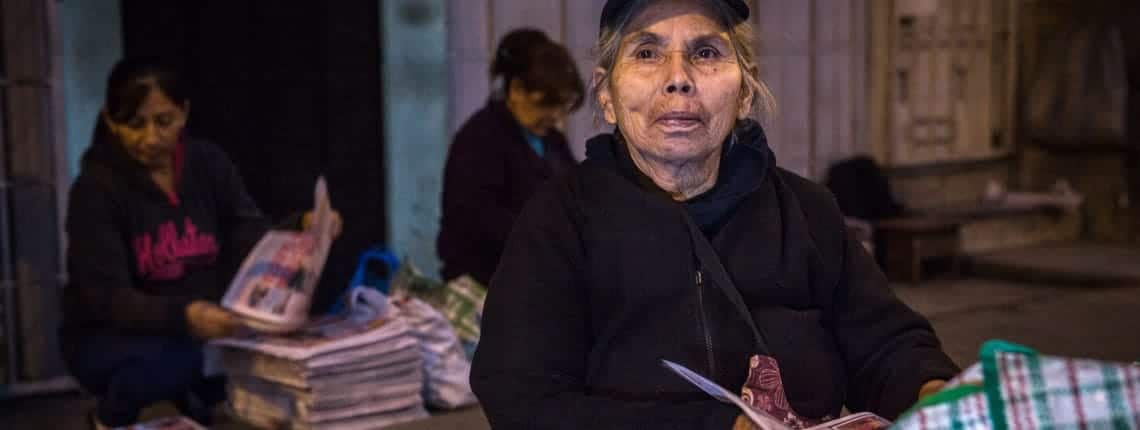Although the world is abuzz over robots and automation in debates over the “future of work,” we know the reality is that 61 per cent of the world’s workers are informal. Particularly in developing economies, this massive informal workforce often lacks even the most essential social protections, including healthcare, childcare and social security.
This year’s Global Social Protection Week, an annual International Labour Organization (ILO) event, will gather participants in Geneva to exchange ideas and map ways forward for achieving universal social protection for all. The conference will use the recently adopted ILO Centenary Declaration for the Future of Work as a framework for technical discussions on design, strategy and implementation.
WIEGO’s belief is that informal workers need access to social protections that will protect them from and mitigate the risks to their incomes and help them cope after an event or shock.
WIEGO’s belief is that informal workers need access to social protections that will protect them from and mitigate the risks to their incomes and help them cope after an event or shock. Lack of access to social protection is a long term, structural problem — one with especially harsh consequences for the working poor, especially women, in the informal economy.
To dive deeper into these issues, we are looking back at some of our key publications and multimedia on issues of social protection and the future of work.
61% of the world’s workers still fighting for 8-hour day
By Jane Barrett
Two-billion workers continue to fall outside regulations for working hours and over-time compensation. Informal workers — now the majority of the global workforce — are calling for much-needed protections to limit their working time, as well as child care, elderly care and social pensions. Read more about what informal workers are fighting for and the progress they’ve made.
How the draft WDR 2019 got it wrong: Rethinking and “relinking” social protections for the future of work
By Laura Alfers
The World Bank’s draft World Development Report (WDR) 2019 makes a controversial call to delink important social protections, such as social security and pensions, from employer-based schemes to meet the needs of a new world of work. Complete delinking, however, could have potentially devastating consequences on the informal labour force, making the poorest workers even more vulnerable. We explore ways to relink social protection in a triangulated way: informal workers, the state, and, importantly, capital.
**New podcast: The future of work and the missing middle: Interview with Christina Behrendt, head of the Social Protection Unit at the International Labour Organization
In this episode, Christina Behrendt, Head of the Social Policy Unit in the International Labour Organization’s Social Protection Department, discusses the relations between the future of work and the challenges to extend social protection to the so-called “missing middle” — workers in the informal economy. We discussed how policies to provide social protection to informal workers can help the debate around forms of work associated with the "gig economy", and whether universal basic income might offer an alternative as the configurations of work relations change.
Listen to all our Informal Economy: Social Protection podcast episodes or read a summary of the first six episodes here.
Four key points to ensure child care reaches the poorest working women by Rachel Moussié
Governments across the Global South — from Peru to Rwanda to Thailand — are investing in quality childcare services to reach the children of the working poor. For Africa, public investments in quality childcare services today could lead to huge dividends with the upcoming demographic youth bulge.
Yet, for these investments to be effective, it’s important to look at the main users of these services and what they are demanding. The nature of women’s work — where they work, what they do, and who they work for — impacts their choices and uptake of childcare services.
“Think rain, not robots”: Shaping the future of work for women in informal employment By Sally Roever
In the informal economy, where 61 per cent of the world’s workers are located, basic technologies still prevail, but innovations abound. It is these other forms of innovation — from adaptations at the workplace to new forms of organizing — that hold immediate potential for improving the quality of work for those who find themselves in working poverty.
To read more about extending social protection to informal workers, see our Briefing Note on current social protection debates and issues from an informal worker perspective.
Feature image: Lucía Builches Ramírez is a newspaper vendor—or canillita, as they are known locally. She is a member of an organization affiliated to the National Federation of Newspapers, Magazines and Lottery Vendors (Federación Nacional de Vendedores de Diarios, Revistas y Loterías del Perú, FENVENDRELP). Newspaper vendors are prone to respiratory diseases, because they are exposed to the cold, rain, and other weather conditions; because they start working at dawn; and because they lack appropriate facilities. While newspaper vendors have a special health clinic to service them, which was stipulated by the law for this sector, the management of the entity and the level and quality of the services are poor. Newspaper vendors say that they only seek attention when it’s something grave. Photo by Juan Arredondo/Getty Images Reportage.
